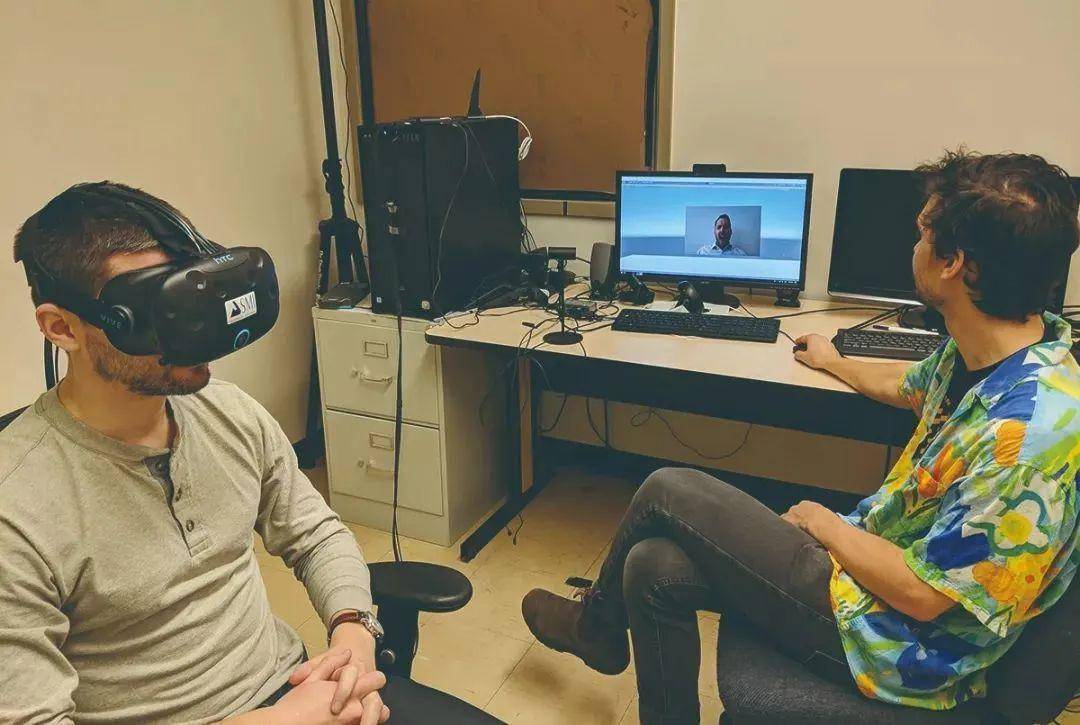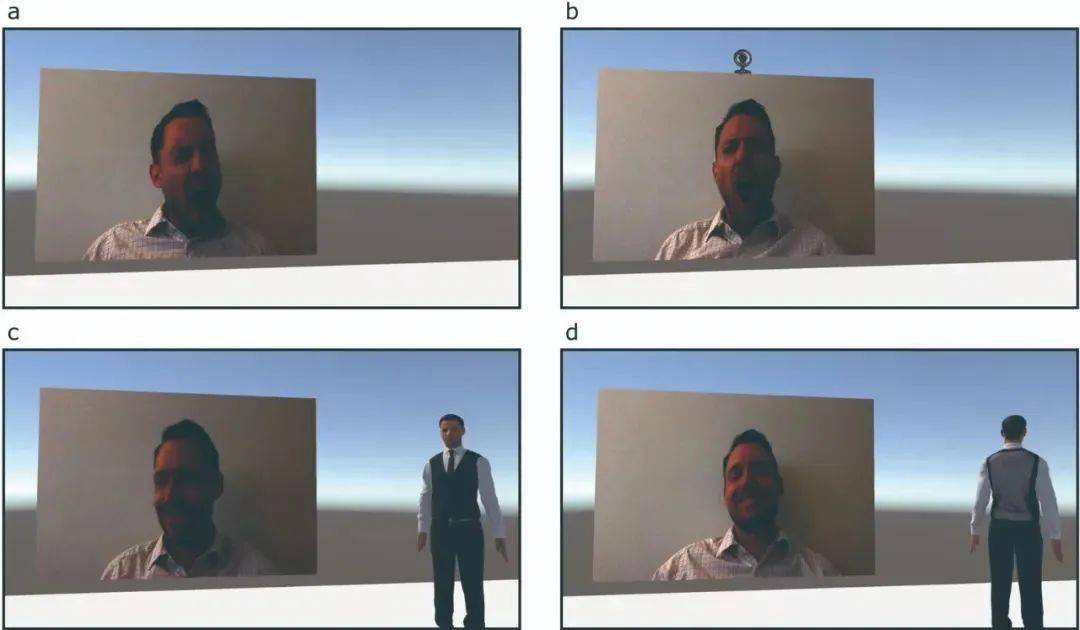 Technology peripherals
Technology peripherals
 AI
AI
 Using VR technology in psychotherapy has significantly improved treatment effectiveness
Using VR technology in psychotherapy has significantly improved treatment effectiveness
Using VR technology in psychotherapy has significantly improved treatment effectiveness
Using VR technology in psychotherapy, the therapeutic effect has been significantly improved
Recently, psychologists are increasingly using virtual reality (VR) technology in psychological experiments. Psychologists can use VR technology to create any environment they need and control all visual and auditory factors, so this technology is very convenient.
The development of VR technology makes it difficult for people to distinguish between virtual scenes and the real world. The brain is tricked into thinking that it is in the virtual environment being viewed. Even though you consciously know that this is VR and not a real space, your brain incorporates senses such as sight and hearing into the virtual reality construct as if they were real.
What is the difference between people’s reactions in a real environment and a VR environment?

VR test yawn
Researchers conducted an interesting experiment - using VR to test yawning.
When we see others yawning, about half of us will also be infected and yawn accordingly. This is a contagious physiological phenomenon. But if someone suddenly appears at this time, such as your leader, then you may stop yawning because you will feel a bit embarrassed to yawn in front of your leader.
Researchers placed subjects in a VR environment. When the subjects saw a "person" yawning in the VR environment, about half of the subjects were also infected. When the "leader" in the VR environment suddenly appeared, the subjects did not stop yawning. In other words, stimuli that trigger contagious yawning in real life have the same effect in VR environments, but stimuli that suppress yawning in real life have no effect in VR environments. Why is this?
Conscious and subconscious
Researchers have discovered that the human brain uses multiple senses simultaneously to construct our perception of reality. Different senses interact and compare with each other to create a seamless sense of reality. When we enter the park, we can not only admire the gorgeous flowers, but also hear the sweet chirping of birds and smell the fragrant fragrance of flowers. Our three senses of sight, hearing and smell work together to create this complete sense of reality. What can be concluded from the VR experience is that building a sense of reality does not have to rely on the participation of all the senses. For example, pure visual presentation is enough to let us feel the beauty of a complete park. Sound was added just to make the realism of the park's beauty more convincing.
Therefore, the contagious nature of yawning can be triggered by visual and auditory stimulation, which is a subconscious behavior. However, when yawning has already begun, our awareness kicks in. Just like we may be suddenly frightened by something happening in the outside world, but we can quickly control our nervousness. People are subconsciously inclined to yawn when they see a leader walking in, even though they feel they are losing their composure by doing so and therefore consciously suppress the behavior. In a virtual environment, because you know that the person coming is virtual, there is no need to control yourself. The behavior of suppressing yawning is not just an unconscious automatic reaction, but can also be controlled through conscious beliefs.

VR technology used in psychotherapy
There is a contrast between what the conscious brain knows and what the subconscious brain feels, like you can overcome fear, but you cannot suppress the tension caused by fear. The results of this study provide researchers with more clues: virtual reality technology has already achieved results in audio-visual aspects, and will focus on the development of tactile experience in the future. This not only makes the experience feel more real, but also helps researchers understand the process by which various sensory modules in the brain interact and compare with each other when people perceive reality.
Currently VR technology is gradually being used to treat psychological and mental illnesses, such as fear of heights, anorexia, social disorders, schizophrenia, etc.
In the treatment of acrophobia, VR technology is mainly used to create virtual situations that make patients afraid of heights, such as looking down from high, taking a transparent sightseeing elevator, etc., in order to eliminate the patient's nervousness; In the treatment of anorexia, patients are allowed to watch virtual characters in a VR environment easily complete some tasks that require high body shape, such as crossing some obstacles, etc., in order to increase the patient's enthusiasm to change their body shape; in the treatment of social disorders , VR technology is used to establish virtual social scenes, allowing patients to participate in social activities with virtual characters in the scene, so as to eliminate patients' social fear; in the treatment of schizophrenia, VR technology is mainly used to simulate schizophrenia patients By presenting virtual hallucinations to patients with schizophrenia, they can understand the process of hallucinations and receive specialized treatment to overcome and eliminate various hallucinations. Clinical practice shows that using VR technology in psychotherapy can significantly improve treatment results.
VR technology has had a profound impact on people’s way of thinking, world view, space and time. In the future, VR technology will be increasingly used in the field of psychotherapy, greatly promoting and improving the level of psychotherapy and becoming a commonly used technology in psychotherapy.
The above is the detailed content of Using VR technology in psychotherapy has significantly improved treatment effectiveness. For more information, please follow other related articles on the PHP Chinese website!

Hot AI Tools

Undresser.AI Undress
AI-powered app for creating realistic nude photos

AI Clothes Remover
Online AI tool for removing clothes from photos.

Undress AI Tool
Undress images for free

Clothoff.io
AI clothes remover

Video Face Swap
Swap faces in any video effortlessly with our completely free AI face swap tool!

Hot Article

Hot Tools

Notepad++7.3.1
Easy-to-use and free code editor

SublimeText3 Chinese version
Chinese version, very easy to use

Zend Studio 13.0.1
Powerful PHP integrated development environment

Dreamweaver CS6
Visual web development tools

SublimeText3 Mac version
God-level code editing software (SublimeText3)

Hot Topics
 1662
1662
 14
14
 1419
1419
 52
52
 1313
1313
 25
25
 1262
1262
 29
29
 1235
1235
 24
24
 Getting Started With Meta Llama 3.2 - Analytics Vidhya
Apr 11, 2025 pm 12:04 PM
Getting Started With Meta Llama 3.2 - Analytics Vidhya
Apr 11, 2025 pm 12:04 PM
Meta's Llama 3.2: A Leap Forward in Multimodal and Mobile AI Meta recently unveiled Llama 3.2, a significant advancement in AI featuring powerful vision capabilities and lightweight text models optimized for mobile devices. Building on the success o
 10 Generative AI Coding Extensions in VS Code You Must Explore
Apr 13, 2025 am 01:14 AM
10 Generative AI Coding Extensions in VS Code You Must Explore
Apr 13, 2025 am 01:14 AM
Hey there, Coding ninja! What coding-related tasks do you have planned for the day? Before you dive further into this blog, I want you to think about all your coding-related woes—better list those down. Done? – Let’
 AV Bytes: Meta's Llama 3.2, Google's Gemini 1.5, and More
Apr 11, 2025 pm 12:01 PM
AV Bytes: Meta's Llama 3.2, Google's Gemini 1.5, and More
Apr 11, 2025 pm 12:01 PM
This week's AI landscape: A whirlwind of advancements, ethical considerations, and regulatory debates. Major players like OpenAI, Google, Meta, and Microsoft have unleashed a torrent of updates, from groundbreaking new models to crucial shifts in le
 Selling AI Strategy To Employees: Shopify CEO's Manifesto
Apr 10, 2025 am 11:19 AM
Selling AI Strategy To Employees: Shopify CEO's Manifesto
Apr 10, 2025 am 11:19 AM
Shopify CEO Tobi Lütke's recent memo boldly declares AI proficiency a fundamental expectation for every employee, marking a significant cultural shift within the company. This isn't a fleeting trend; it's a new operational paradigm integrated into p
 GPT-4o vs OpenAI o1: Is the New OpenAI Model Worth the Hype?
Apr 13, 2025 am 10:18 AM
GPT-4o vs OpenAI o1: Is the New OpenAI Model Worth the Hype?
Apr 13, 2025 am 10:18 AM
Introduction OpenAI has released its new model based on the much-anticipated “strawberry” architecture. This innovative model, known as o1, enhances reasoning capabilities, allowing it to think through problems mor
 A Comprehensive Guide to Vision Language Models (VLMs)
Apr 12, 2025 am 11:58 AM
A Comprehensive Guide to Vision Language Models (VLMs)
Apr 12, 2025 am 11:58 AM
Introduction Imagine walking through an art gallery, surrounded by vivid paintings and sculptures. Now, what if you could ask each piece a question and get a meaningful answer? You might ask, “What story are you telling?
 Newest Annual Compilation Of The Best Prompt Engineering Techniques
Apr 10, 2025 am 11:22 AM
Newest Annual Compilation Of The Best Prompt Engineering Techniques
Apr 10, 2025 am 11:22 AM
For those of you who might be new to my column, I broadly explore the latest advances in AI across the board, including topics such as embodied AI, AI reasoning, high-tech breakthroughs in AI, prompt engineering, training of AI, fielding of AI, AI re
 How to Add a Column in SQL? - Analytics Vidhya
Apr 17, 2025 am 11:43 AM
How to Add a Column in SQL? - Analytics Vidhya
Apr 17, 2025 am 11:43 AM
SQL's ALTER TABLE Statement: Dynamically Adding Columns to Your Database In data management, SQL's adaptability is crucial. Need to adjust your database structure on the fly? The ALTER TABLE statement is your solution. This guide details adding colu



